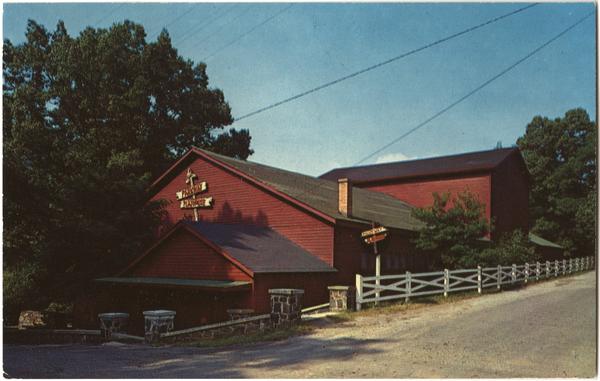On July 21, 1947, the curtains opened on a new venture for the Woman’s College – the Burnsville School of Drama. Running for six weeks in the North Carolina mountain town of Burnsville (about 40 miles northwest of Asheville), the school was a partnership between WC and Burnsville Playhouse, Inc., a local non-profit organization that managed ticket sales, marketing, and other details related to engaging the general public. WC faculty staffed the school, offering course credit in topics such as playwriting, play production, and acting. Burnsville locals also offered an old Burnsville High School gymnasium as a site for the theater, which was quickly remodeled to seat 400 guests (eventually renamed the Parkway Playhouse). They also provided housing to students and staff of the school in their private homes.
W. Raymond Taylor, a WC professor of drama who had long advocated for an art colony in western North Carolina, served as the school’s director. In its first season, the School of Drama produced ten performances of three popular Broadway shows — “Claudia,” “Blithe Spirit,” and “Our Town.” Audience members came from across the United States and three foreign countries to see the performances. The school was placed on the approved list of summer stock theatre companies by the New York Times and The New Yorker magazine. Additionally, a $10,000 grant from the Carnegie Foundation was secured in 1948 to support the continued development of the school for the next four years. Seeing the school as “afford[ing] facilities for the training of veterans in the fine arts,” the Veterans Administration provided additional support, and military veterans were allowed to attend the school with federal aid using the G.I. Bill.
Over the next four years, the curriculum expanded, and the school adopted a name more inclusive of the courses taught — the Burnsville School of Fine Arts of the Woman’s College. In addition to classes in theater and drama, students could take courses in art, creative writing, dance, education, and music. Men and women were both allowed to take classes, but enrollment in the drama program was strictly limited to fifty students.
In that time of initial development, however, some argued that Taylor’s drama background meant that he, as the school’s director, emphasized theater over the other parts of the curriculum. Ticket sales for dramatic performances also were lagging behind estimates. As a result, in 1952, leadership of the school was transferred to Gregory Ivy, head of WC’s art department. At that time, the school was also recognized as a fully accrediting branch of the college, offering scholarships as well as undergraduate and graduate credit on the same basis as work completed during summer session on the Greensboro campus. Branches of the college library and bookstore were also established in Burnsville.
But these changes did not fully revive the school. In 1954, the school was moved from Burnsville to Beaufort on the North Carolina coast. WC had a marine biology program in Beaufort, and, before the establishment of the Burnsville School, Ivy had briefly led a “summer colony” in Beaufort that focused on “advanced landscape painting.” But, the move to the coast wasn’t enough to save the program. In 1955, Chancellor Edward Kidder Graham made the decision to terminate WC’s connection to the school and the Playhouse.
For the next thirteen years, the University of Miami (Fla.) operated the playhouse. But in 1966, UNCG returned thanks in large part to a $25,000 appropriation from the North Carolina Legislature that paid for refurbishment of the buildings. Taylor was lured out of retirement to direct the return production, staging “Our Town,” which had inaugurated the playhouse in 1947. But, once again, the playhouse ran a deficit and, by the 1980s, the building itself was again in need of massive repairs (including asbestos removal). In the 1990, the university once again terminated its affiliation with the school. The Parkway Playhouse, however, continues operations, producing shows featuring professional, semi-professional, volunteer and student actors.
This post is one in a series focused on the 2015 North Carolina Archives Month theme “Celebrating Archives: North Carolina Arts, Crafts, and Music Traditions.” North Carolina Archives Month, celebrated each October, is an annual observance of the agencies and people responsible for maintaining and making available the archival and historical records of our nation, state, communities, and people.
Article written by Erin Lawrimore

